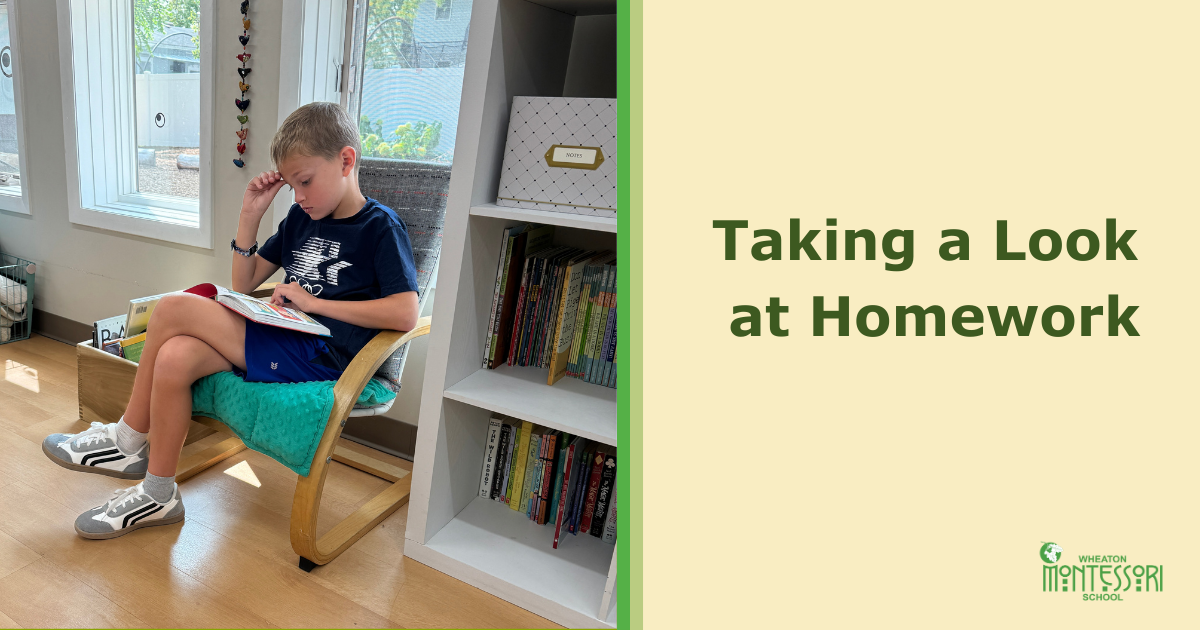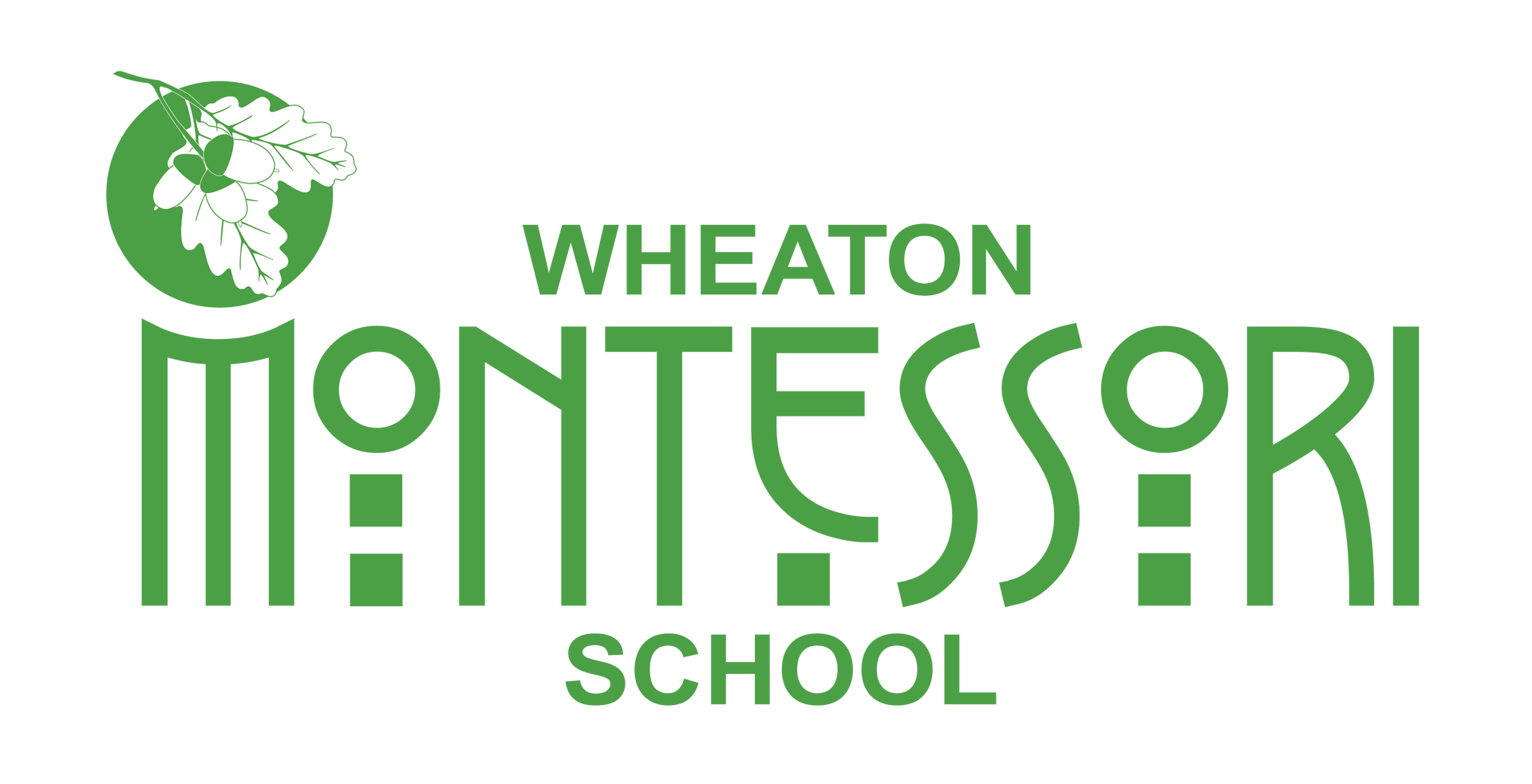
Many of us grew up with some form of homework, so it can feel a little strange when our Montessori kids come home without it. In fact, we may start to wonder what our children are missing by not having homework. This is a common worry to share with our teachers.
Perhaps some worries have crossed your mind: Don’t my children need additional practice to help improve their retention? Doesn’t homework help reinforce concepts learned in school? Doesn’t homework serve as a tool for teaching responsibility, self-discipline, and time management? How will I know what my child is doing or how they are doing? The neighbor kids have homework.
Let’s lean into these questions to explore what happens in Wheaton Montessori School classrooms and whether homework meets children’s developmental needs.
Do our children need additional practice to help improve their memory?
Unlike our youngest ones, who love endlessly to read the same book. Once our children reach the elementary years, they crave variety. Thus, the key is to provide lots of different kinds of opportunities for practice. For example, at Wheaton Montessori School, our classrooms have SO MANY ways for students to practice their multiplication facts: the large bead frame, bead bars, bead chains, multiplication board, checkerboard, multiples, common multiples, cubing, and the bank game, just to name a few.
At school children love to practice and challenge themselves. So should we assign practice for them to take home? Author and researcher Alfie Kohn spent years reviewing the available research (as well as interviewing parents, teachers, and students), and he sums up his findings with the following statement: “Homework is all pain and no gain.” In fact, in studying the research, Kohn found that having and doing homework during the elementary years does not improve learning. That being said, in high school there is a small correlation between homework and test scores, although no clarity about whether doing the homework leads to higher test scores.
We’ve also found that when children are engaged and loving their varied practice at school, requiring that they continue the practice at home can actually backfire. For example, when children are made to do academic work at home, we see that they are less likely to engage with similar learning activities at school. When children are excited about their learning and initiate continuing at home, we encourage and celebrate, but this isn’t necessary!
Does homework help reinforce concepts learned in school?
We want children to see themselves as life-long learners. One way we support this is to avoid the dichotomy of home versus school. Learning doesn’t stop or start at the classroom door! Perhaps at school, a child is suddenly passionate about sea turtles. We explore how this learning can extend into the community: visiting Shedd Aquarium aquarium for a real-life encounter, finding sea turtle books from the library, watching a sea turtle documentary, etc. Some of this could happen through going-out trips we have in our elementary classes and could also be something the child’s family embraces to support the learning experience.
Learning (rather than preassigned homework each night) is meaningful and relevant. Just as an adult might be motivated or excited about a project at work or a hobby and wants to continue some of the process at all available moments, we want our students to realize that their learning has no bounds of time or space! This could work in the other direction, too. Maybe a child asks a question at home one night about how stars are formed, which leads to a deep dive at school into types of stars, galaxies, and even chemistry.
This understanding that learning happens throughout all aspects of our lives is a hallmark of Montessori education. We emphasize deep, hands-on engagement with varied kinds of learning materials. Our curriculum is designed to support an explosion of imagination and curiosity. Children ask questions, explore, and work through big concepts at each child’s ideal pace, challenging but not frustrating.
Does homework serve as a tool for teaching responsibility, self-discipline, and time management?
Montessori education is grounded in a deep respect for young people. Our unique approach is designed to cultivate responsibility, self-discipline, and time management skills. Montessori classrooms provide children with the freedom to choose their work, but within a structured environment and framework. This freedom is tied together with responsibility and teaches students to make well-informed choices about how they spend their time and what tasks they prioritize. Through one-on-one conferencing and daily journal recording, classroom teachers provide guidance and reflection that empowers students to think about their own learning process, including what parts could use more attention.
Instead of relying on external rewards or punishments, Montessori emphasizes intrinsic motivation. Students engage in activities because they are interested and find satisfaction in completing them, which nurtures self-discipline. And if a child avoids an area, teachers have additional follow-up lessons to increase interest. I especially love that children are able to support each other which develops confidence. This intrinsic motivation, interest, and confidence allows them to focus deeply on their tasks, developing concentration and persistence, which are core aspects of self-discipline.
Ultimately, there is work to be done and sometimes even deadlines to meet. As we experience in the adult world, if we have procrastinated, lost focus, or just had to tend to other things, the work doesn’t go away, and sometimes we have to bring it home to make sure we get it done. The same applies to Montessori students. Sometimes they will need to bring some work home to meet a deadline or work through a challenge that needs more time.
Our teachers may also work with older students to create individual learning plans so that they can more consciously plan their day or week to meet their goals. We scaffold this skill so our young people can learn how to incorporate goal setting, planning, and time management into their lives.
In a supportive way, we integrate choice, autonomy, and responsibility into students’ daily routines. The result? Wheaton Montessori School’s students feel empowered, take ownership of their learning, and have the gift of devoting afternoons and evenings to rest, family bonding, exploring personal interests, and strongly encourage dedicating at least 30 minutes each day to reading.
Interested in seeing for yourself how all of this works? Current families are invited to schedule their classroom observation by clicking on links below.
Adolescent Community Classroom Observation
Ms. Searcy’s Upper Elementary Classroom Observation
Mrs. Fortun’s Lower Elementary Classroom Observation
Mrs. Mayhugh’s Lower Elementary Classroom Observation
Mrs. Berdick’s Primary Classroom Observation
Ms. Carr’s Primary Classroom Observation
Ms.Chiste's Primary Classroom Observation (available for observation in November)
Mrs. Rogers’s Primary Classroom Observation
Prospective families are invited to schedule a tour and learn how Wheaton Montessori School cultivates a balanced environment where intellectual growth and personal development go hand in hand, while children are becoming more confident, curious, and capable of managing their time effectively.


